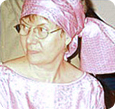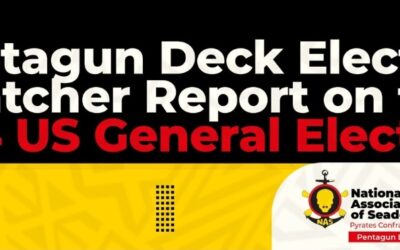Indications emerged yesterday that the Federal Government might try four suspected spies, including two Germans for espionage in camera at the Federal High Court in Abuja.
The hint was dropped by the Director of Public Prosecution (DPP), Malam Salihu Aliyu, when he told the court that he had sensitive security documents indicting Dr. Judith Asuni and Mr. Danjuma Saidu.
The DPP also urged counsel to the accused persons not to make public the said "sensitive security documents" when he (DPP) eventually makes them available to him to prepare his client's defence.
According to the DPP, although he had filed a preliminary objection to the bail applications of Asuni and Saidu, he could not attach the exhibit to the objection until the next adjourned date as it had security implications for the Niger Delta region and the country at large.
However, in government's preliminary objection, the DPP claimed that Asuni and Saidu were in possession of documents capable of aggravating the crisis in the Niger Delta.
Last Friday, the two Germans, Florian Orpitz (35) and Andy Lehmann (26), charged alongside Asuni and Saidu were granted bail by the trial judge, Justice Binta Murtala-Nyako.
For Asuni and Saidu, the court remanded them in the custody of the State Security Service (SSS) and adjourned till yesterday to hear their request for bail.
But the court could not hear their application for bail yesterday as government had filed fresh documents alleging that if they were released, they would threaten the nation's security.
Ahead of the court session yesterday, lawyers from the DPP's office arrived at the court to file the documents. They filed a counter-affidavit and a document containing the messages exchanged between Saidu and the two Germans to enable the Germans get visas from the Nigerian embassy in Germany.
Counsel to Asuni and Saidu, Prof. Yemi Osinbajo (SAN) and the DPP agreed to meet in private to study the new document filed by the DPP.
They later went to meet with the judge in chambers where it was agreed that the case be adjourned to October 16 for the accused persons to react to the new allegations contained in the counter-affidavit just filed.
In the counter-affidavit, which was deposed to by Grace Aricha, a litigation clerk at the DPP at the Federal Ministry of Justice, government stated that there was still another sensitive document to be presented in court. The document, titled Annexure 'A' was not released to reporters.
The affidavit reads: "That because of the security implication of Annexure 'A', the DPPF would at the next adjourned date seek to tender the said Annexure 'A' from the Bar.
"That the State Security Service are still investigating not only how Annexure 'A' was obtained by the first and fourth accused persons (Asuni and Saidu) but more importantly for who and to whom the first and fourth accused persons have provided Annexure 'A'.
"That Annexure 'A' if passed to foreign governments could have serious security implications not only in terms of Nigeria's investment climate but for any enemies of Nigeria or even adventurers who would want to exploit the situation and incite violence in order to sell arms and engage in oil bunkering."
Government asked the court not to release Asuni and Saidu because they have refused to disclose, "who have requested for and obtained Annexure 'A' from them."
Government stated that if released on bail, the duo would continue to supply information such as is contained in the document in question and could be issued to any willing foreign buyer.
"That if released on bail the first and fourth accused will interfere with investigation as the first accused in particular is a woman of substantial means with powerful connections, including heads of government, security agencies, embassies, oil companies, to mention a few."
Another document showing the correspondence on how Asuni and Saidu colluded with the two Germans to deceive the Nigerian embassy in Germany was also attached and marked Annexure 'B'.
A copy of this was obtained by The Guardian.
Excerpt from the letter written to Saidu by one of the Germans, Optiz on August 9, 2007 reads, "We are planning to come from September 6th to September 25th approximately, but we have not finally booked our flights yet. This should be completed by the beginning of next week latest.
"The purpose of our visit is general research on the situation in the Niger Delta and how it could be improved.
"I am not sure it is wise to mention in the letter that we are film-makers, as this might raise questions and make it more difficult to get visa at the Nigerian embassy in Berlin …. What do you think? Do you have any experience with this?"
In his response to the letter dated the same and just three minutes after receiving the email from Optiz, reads: "We usually sent invitation letters to our guests who wish to visit Nigeria and they don't have much problem getting visas. We usually write to whom it may concern informing him/her who is coming, from which organisation, the purpose of the visit, etc. we then print the letter on our letterhead paper, scan and send.
"In your case, I need to know the name of your organisation, your position in the organisation.
"But since you don't want the Nigerian embassy to know you are film-makers, why don't you say you are from an international NGO that is collaborating with AAPW to conduct general research on the situation in the Niger Delta and how the situation could be improved?"
All the accused had pleaded not guilty to the charges of alleged conspiracy and spying in a manner detrimental to the security of the nation.
In a seven-count charge, the accused persons were alleged to have conspired to commit felony and entered the vicinity of protected places in Lagos, Warri (Delta) and Port Harcourt (Rivers) for a purpose prejudicial to the security of the country.
They were also charged with taking photographs of things situated in the protected places contrary to the Official Secrets Act.
Specifically, they were alleged to have taken photographs and videos of pipelines, refineries, petroleum installations, ships and other things situated in the protected places.
Asuni and Saidu were alleged to have aided the Germans to make false declaration to the Nigerian embassy in Germany for the purpose of obtaining visas to Nigeria.
The Germans were said to have falsely presented themselves as academic researchers whereas they are film-makers.
Lemmy Ughegbe
The Guardian
Tuesday, October 09, 2007




